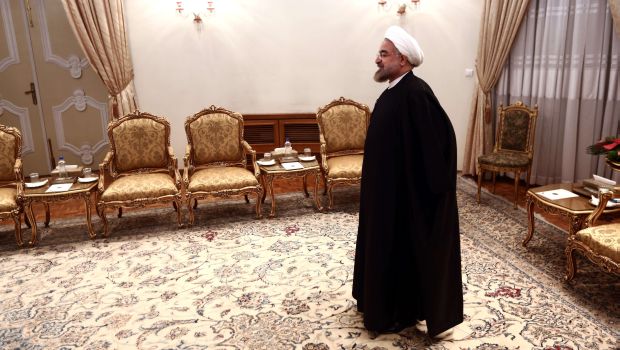Iran’s President Hassan Rouhani won a convincing victory in the June 2013 elections. He ran on a moderate platform, promising to overhaul the political status quo in the country. In the process, he handily trounced the original seven largely conformist presidential candidates. No one can doubt that fact, or that a clear majority of ordinary Iranians yearn for a change of direction in the policies of their Islamist government.
At the same time, no one can deny that Rouhani is still a regime insider. His entire political career has been spent serving the government that has ruled Iran since the revolution of 1979. From the outset of his presidency, this has been widely considered inside Iran to be a double-edged sword.
On the one hand, the skeptics wonder how a longtime regime insider who calls himself a loyal foot-solider of Supreme Leader Ayatollah Ali Khamenei can shake up Iran’s stagnant economy and decaying political system. On the other, the optimists point to Rouhani’s insider credentials as exactly the reason for their enthusiasm.
The argument by the optimists is simple and goes something like this: the only hope for political reform in Iran will have to come from within the ranks of the regime, as there is no viable opposition either inside Iran or beyond the country’s borders, among the large Iranian diaspora.
In his first five months in office, President Rouhani has set out to prove the optimists right while attempting to convince the doubters. But in his search for political validation, Rouhani has still been both selective and also cautious. When combined, Rouhani’s tactical policy pursuits might still generate the bigger strategic shift in the country’s direction that he promised the Iranian electorate this past summer.
Rouhani’s first attempt at change came in the foreign policy arena. His campaign pledges had plenty to say about the need to reverse Tehran’s isolation on the international stage. In office, he has come to relish the title of “Diplomatic Sheikh” that his supporters have given him. He has also doggedly defended the nuclear compromise deal that his foreign minister, Mohammad Javad Zarif, reached with six world powers in Geneva in November.
Thus Rouhani already holds that he has delivered on his campaign’s foreign policy pledges. As he put it in a recent television interview, “At least, no new sanctions will be imposed on Iran while the [nuclear] negotiations continue.” Some might judge the sole objective of averting new sanctions to be setting the bar somewhat low in terms of expectations, but Rouhani is pleading for patience. No one, he says, should be under any illusions that breaking Iran’s international isolation will be anything other than a long process.
As soon as the Geneva nuclear deal was signed, attention was turned toward two other principal promises that Rouhani made in his campaign: to fix the fractured economy and to rejuvenate Iran’s rich-but-wary civil society.
The fate of the economy is closely linked to Rouhani’s ability to overcome the painful sanctions, as oil exports were once 80 percent of the government’s revenue, generated from exporting approximately 2.5 million barrels of crude oil per day. Today, Iran’s daily exports are less than half that. If the Rouhani government can manage to break the sanctions, then the economy will no doubt quickly feel a positive jolt. This policy objective will become ever more imperative in the months to come, as Rouhani cannot blame the state of the economy on eight years of mismanagement by his predecessor, Mahmoud Ahmadinejad, forever.
Rouhani’s third principal election promise related to ending what he calls the “security state.” His speeches are peppered with slogans such as “the people should have peace [from government intrusion]” and that only “hope, calmness and tolerance” can save Iran from its many challenges. The slogans are plentiful, but the fact remains that he has yet to deliver anything discernible on this front. His only claim to have loosened the government’s interference in peoples’ lives seemed to be linked to his government’s relaxing of laws regulating censorship of the press and other publications.
The slower pace of change on the domestic front is probably very deliberate on the part of President Rouhani. He has himself said that the nuclear talks in Geneva were guided and approved by Supreme Leader Ayatollah Khamenei. It is doubtful that Rouhani can secure the same mandate from the leader to go ahead and implement bold political reform at home.
And that is why a Rouhani presidency was from the outset viewed by Iran’s legions of reformist supporters as a double-edged sword. He can implement change because he is a regime insider, but only to a certain extent. Time will tell if Rouhani, who has so far opted not to cross any of Ayatollah Khamenei’s red lines, will find it in himself to diverge from the guiding hand of Iran’s ultimate leader in order to genuinely fulfill his promise of renewal both abroad and at home.
This article was originally published in The Majalla.
All views expressed in this blog post are those of the author and do not necessarily represent the views of, and should not be attributed to, The Majalla magazine or Asharq Al-Awsat newspaper.

